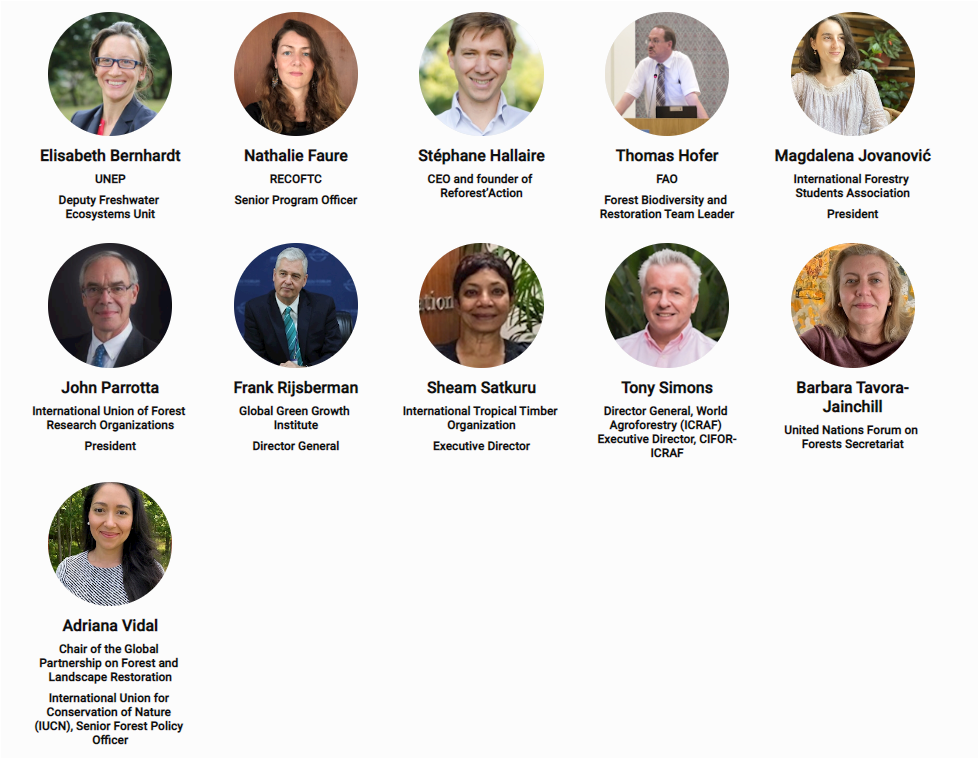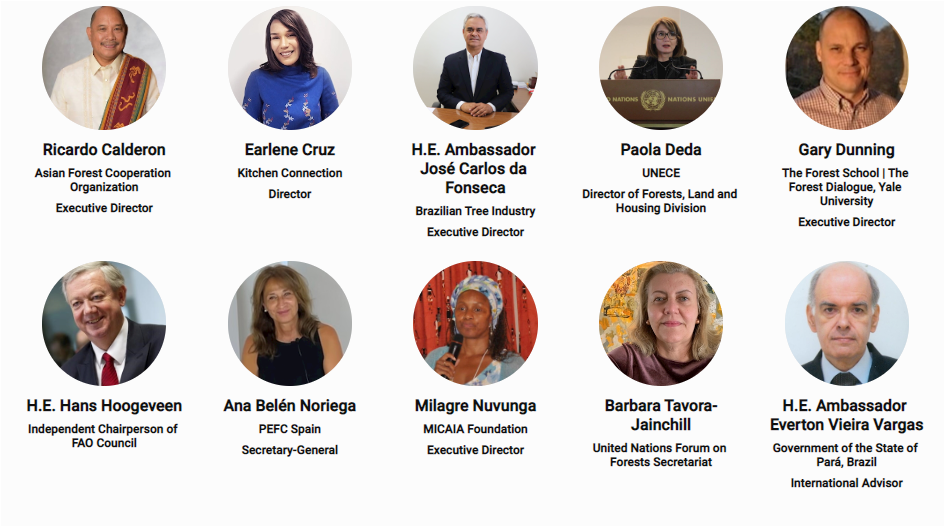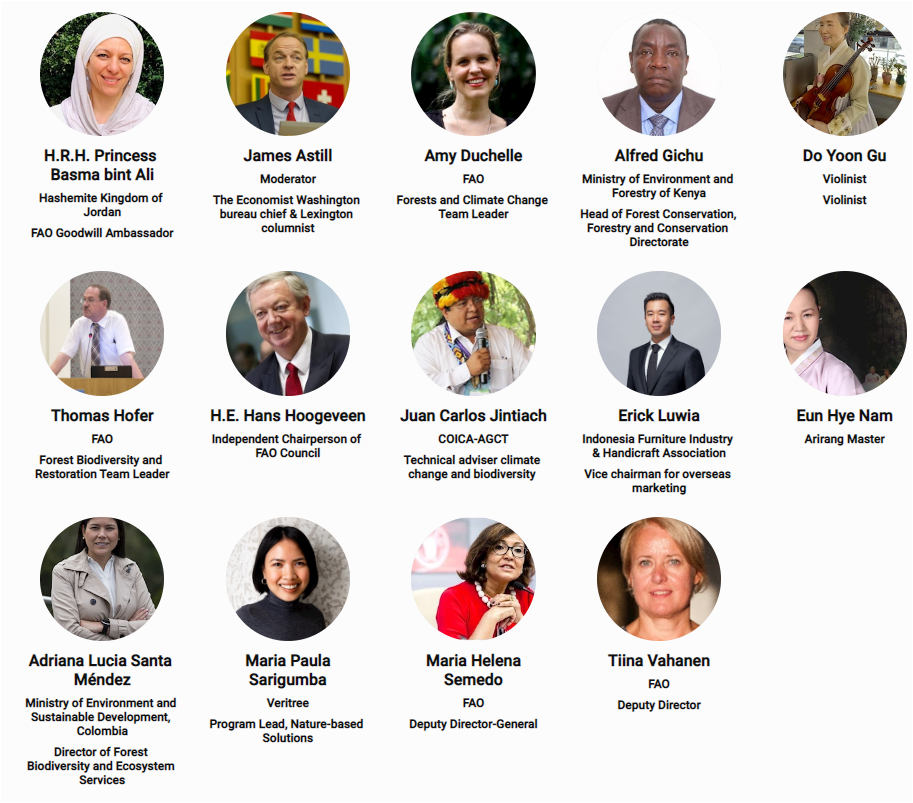
Sub-theme 6: Forests without boundaries: enhancing management and cooperation
Sub-theme 6 will draw attention to forests in the context of landscape dynamics and the multisectoral coordination and partnerships required to achieve meaningful sustainable forest management. The sub-theme will be directly relevant for many Sustainable Development Goals of the 2030 Agenda and the Global Forest Goals of the UN Strategic Plan for Forests.
Setting the stage: landscape approach and cooperation in forest management
May 2, 2022 | 4:00 PM KST - 5:30 PM KST
Watch the video replay English | French | Spanish | Korean
This opening session will be a high-level and strategic reflection about forests in the broader landscape context – 'forests beyond forestry'. The strategic importance of cooperation with all its dimensions will be highlighted to bring forestry prominently into the discussions of global and regional frameworks of the development agenda.
This high-level introduction to sub-theme 6 will be delivered through two keynote speeches, followed by a high-level panel with representatives from 5 key institutions to reflect on the messages presented from different entry points. A short video will illustrate the concept/approaches and benefits of sustainable forest management in the overall landscape context.
Speakers

Forest-water connections to achieve the SDGs
May 3, 2022 | 11:00 AM KST - 12:30 PM KST
Watch the video replay English | French | Spanish | Korean
This session will focus on the contributions of water-centred sustainable forest management, or SFM with the provision of water services as a main management objective, to achieving the SDGs. Specifically, the focus will be on improving integration of water in forest management and how to maximize the outputs from the forest-water nexus at different scales and landscapes from the mountains to plains and rivers. The session will explore questions such as how forests provide water-related benefits and how do we manage them? The session organizers and partners will also look ahead and deliberate how these contributions can be up-scaled and what kind of barriers need to be overcome.
Objectives
The objective is to demonstrate how the forest-water nexus, and specifically water-centred SFM, is key to achieving the SDGs. Landscape approaches that have the provision of water services as one of the main management objectives are increasingly being implemented as a form of SFM, as they go beyond the boundaries of traditional forest management by focusing on the range of co-benefits that come from this focus. In order for water-centred SFM to make an effective contribution to the achievement of the SDGs, it is vital to strengthen technical cooperation between all levels of society. This includes governments and organizations, regional departments and corporations, as well as local and indigenous community members.
Speakers

Partnerships with Indigenous Peoples and local communities that deliver sustainable forest management in fragile ecosystems
May 3, 2022 | 4:00 PM KST - 5:30 PM KST
Watch the video replay English | French | Spanish | Korean
In large parts of the world, local communities and Indigenous Peoples are the custodians and managers of forests. Their livelihood systems often consist of a combination of forestry, crop production and livestock rearing and, accordingly, local communities have been practising sustainable forest management with a landscape approach for centuries. However, they face challenges of climate change, resource overuse, unclear tenure rights, market forces, pressure from timber companies, political marginalization, etc.
This session will discuss how local communities and Indigenous Peoples can be supported to address these challenges and to increase the resilience of their livelihoods by diversifying forest management and enhancing the landscape approach. The discussion will focus on vulnerable ecosystems such as mountain areas, drylands, coastal (mangrove) systems and peatlands. Forests in these ecosystems are particularly important for their rich biodiversity and the important ecosystem services they provide. They also provide essential food, goods and services for local communities.
Objectives
The objective of this session is to discuss challenges, opportunities and lessons learned for sustainable forest management in fragile ecosystems with a landscape perspective and with a focus on local communities and Indigenous Peoples.
The discussions will be forward looking and will reflect on approaches and ways to strengthen the resilience of these ecosystems and livelihood systems - with forests as an entry point and landscapes as the overall context.
Speakers

Partnerships and collaboration for sustainable forest management
May 4, 2022 | 11:00 AM KST - 12:30 PM KST
Watch the video replay English | French | Spanish | Korean
This session will discuss how cross-sectoral collaboration and partnerships involving different stakeholders can successfully promote and implement sustainable forest management throughout the world. The objectives of the United Nations Strategic Plan for Forests includes the fostering of international cooperation, including North-South, South-South, North-North and triangular cooperation, as well as public-private partnerships and cross-sectoral cooperation, at all levels. The UNSPF also stresses that regional and subregional bodies and processes provide a crucial bridge between international policies and national actions and are important partners in efforts to implement the strategic plan and achieve its global forest goals and targets.
Objectives
The main objective of the panel is to present innovative partnerships and projects which support the sustainable management of forests, seek nature-based solutions and promote a circular economy throughout the world in different ways.
Speakers

The way forward – enhancing partnerships for sustainable forest management
May 5, 2022 | 2:30 PM KST - 4:00 PM KST
Watch the video replay English | French | Spanish | Korean
This final session for Sub-theme 6 will be forward-looking and put forestry in a very broad context of landscape management, institutional arrangements and cooperative mechanisms – forests beyond boundaries, forests beyond forestry! The aspiration is to make this session and its key messages memorable by applying an innovative format. The core part of the session will consist of lively dialogues among different stakeholder groups and representing different regions. Final reflections and key messages will captured into a powerful vision for the future. The session will be honoured by the presence of HRH Princess Basma Bint Ali of Jordan who will deliver the high-level closing keynote speech.
Speakers

